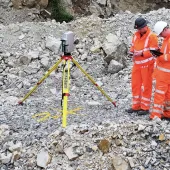Environmental regulatory costs set to double

Mineral Products Association says environmental regulatory costs likely rise to £641 million by 2020
THE Mineral Products Association (MPA) has published its latest report assessing the cumulative costs of environmental regulation on the mineral products sector, which identifies that hundreds of millions of pounds worth of costs are set to almost double by 2020, in spite of some examples of positive action by government.
The Association says regulatory costs and burdens on the mineral products industry feed through into wider economic costs and the general costs of doing business in the UK. The MPA’s assessment has found that:
- Environmental and planning-based regulatory costs are set to increase from £324 million in 2013 to £641 million per annum in 2020.
- These costs are significant: they are equivalent to 28% of aggregates industry Gross Value Added (GVA) and 7% rising to 49% of cement industry GVA.
- This is in addition to all other taxes paid by the sector, eg VAT, business rates, National Insurance, fuel duty etc, that cost at least £900 million annually.
- There has been a trend towards stealthy growth in regulation and more cost-recovery models are being imposed by regulators and public agencies.
- Evidence indicates that measures designed in Europe for the best of intentions can lead to disproportionate costs and bureaucracy for UK businesses.
- An assessment of legislation and regulation relevant to industry businesses has identified approximately 340 environment- and planning-related laws and regulations managed by the industry – not all of these measures will apply to every business.
Nigel Jackson, chief executive of the MPA, said: ‘The good news is that government does recognize the need to manage regulatory impacts better and has taken positive action. The bad news is that identified costs are set to double by 2020 and the scope of costs is increasing.
‘There is an urgent need for both the volume and quality of regulation being imposed on the mineral products sector to be subject to some form of strategic collective management and control within government.’
Mr Jackson continued: ‘The MPA is not opposed to regulation; it supports high operating and sustainability standards and effective regulation designed to achieve clear objectives and implemented efficiently, reasonably, consistently and proportionately. However, a key concern remains that there is no process in government to monitor or manage the cumulative impacts of regulations on the industry from the various parts of government.’
The mineral products industry is one of the most significant production and manufacturing sectors in the UK, with a turnover of nearly £9 billion and GVA of more than £4 billion. The industry supplies 250 million tonnes of materials annually to the construction industry and to a wide range of other industries, and the industries supplied by the sector have an annual turnover of £400 billion which supports more than 2.5 million jobs.
‘The minerals products industry is by far the largest supplier to the construction industry and its activities represent the largest materials flow in the economy,’ said Mr Jackson. ‘However, if the industry is to realize its full potential in helping to deliver economic growth, government needs to reduce the cumulative costs and regulatory burdens it faces.’









